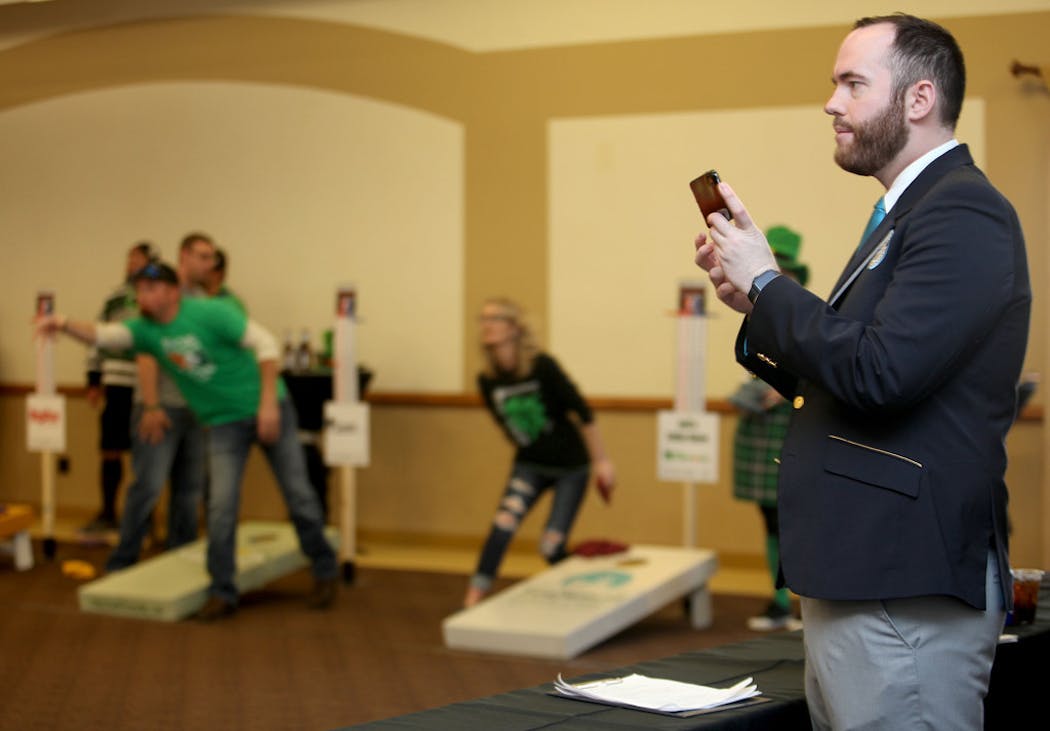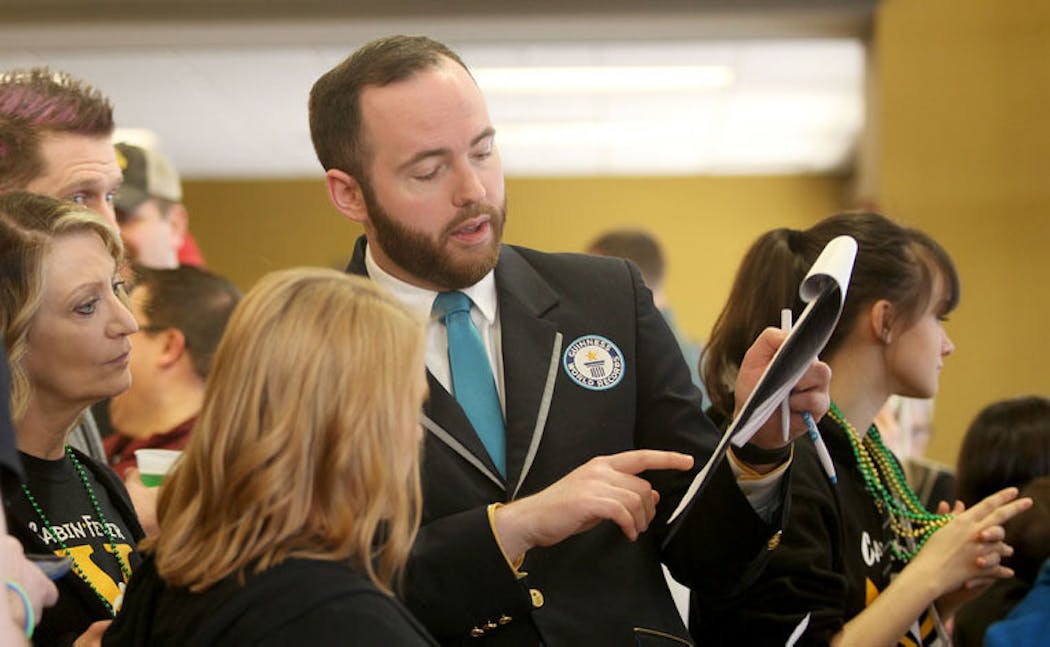On a hot, sunny Saturday last August, a huge line of hundreds of boats filled a bay of Lake St. Clair near Detroit for the annual daylong floating party known as the Raft-Off.
The revelers included thousands of women in bikinis and men in swim trunks and flip-flops. There was also a guy from Minnesota, sweating in a navy blazer, gray trousers, dress shirt, necktie and clipboard. He was one of the few people not in or on the water and not drinking a beer. Instead, he was counting.
That was Mike Marcotte, the man from Guinness.
More precisely, Marcotte is a Guinness World Records adjudicator, one of the judges that the record-keeping and publishing company hires, trains and dispatches around the world to deem whether something is the world's biggest, longest, heaviest, tallest or some other measurable superlative.
Marcotte was in Michigan to judge the attempt on the world record for the "largest boat tie-up," last set when 1,651 boats were tied together in a single unit on a lake in Kentucky in 2010.
The 32-year-old Minneapolis resident also was in northeast Texas when hundreds of motorcyclists tried to set the world record for largest parade of Harley-Davidsons. In San Diego when an attempt was made on the record for most waste paper shredded in eight hours. And in Canada, watching to see if the world's largest sugar cube structure would be built.
Marcotte is a world-record decider, the guy on the spot with the job of declaring to hundreds of participants or dedicated volunteers that they just claimed their 15 minutes of fame — or that their hopes of Guinness glory fell short.
"There's always something new and fun," said Marcotte of his job as the arbiter of offbeat pinnacles of human achievement. "I get to see the biggest of the big, and the smallest of the small."
Marcotte got his part-time gig moonlighting as a judge for Guinness partly as a result of his day job as producer and reporter for the KSTP-TV show "Twin Cities Live," where he works behind and in front of the camera. In March 2017, he emceed an event for Hubbard Broadcasting in the rotunda of the Mall of America in Bloomington: a Guinness World Records attempt for the "largest epilepsy training lesson."
That's where Marcotte met a Guinness adjudicator and discovered that ordinary people were being paid to witness other ordinary people trying to do extraordinary things.
"I was completely envious," he said.
Marcotte thought he might be a good fit for the job. "I love to travel. I love to meet new people." So, he decided to apply.
Guinness decided he was a good fit, too. The company seeks adjudicators who are decisive and who are able to speak in front of large groups of people. In his day job, Marcotte appears on Channel 5's "Local Guy About Town" segments, talking about the best meat raffles and fish fries in the Twin Cities area.
After he passed a job interview at the Guinness North America headquarters in New York in July 2017, he was hired as a freelance adjudicator. Then he underwent a week of intensive training at Guinness world headquarters in London before he got his official adjudicator jacket with the Guinness World Records logo.
"I was joyous," Marcotte said of the moment, which put him in rare company.
Guinness has only about 100 adjudicators worldwide and a dozen in the United States. He's the only one from Minnesota.
Since getting the job, he's been sent to verify whether the "world's largest cheeseboard" was created in Madison last summer by the Dairy Farmers of Wisconsin. He went to the International Plowing Match, a five-day festival last September in Pain Court, Ontario, to judge record attempts for the largest egg-and-spoon race, the most people bobbing for apples at one time and the largest bloody Mary cocktail.
Closer to home, he was on hand last November when the world's longest ice hockey pass took place on Lake of the Isles in Minneapolis. And last weekend, he was in Rochester to verify an attempt by the Cabin Fever beanbag tournament to set the record for largest cornhole event.
Amid hundreds of beanbag tossers gathered at an event center near the Rochester airport, Marcotte was a minor celebrity — with his official clipboard and his dignified teal-lined blazer, complete with its Guinness logo gold buttons and matching teal tie and shoelaces.
"An adjudicator is a Latin term for judge," he explained to one of the many curious people who would approach him throughout the day. "It sounds fancier."
"I've never met a Guinness World Records person," said Rochester resident Cory Behnken, one of the dozens who asked to have a picture taken with Marcotte. "And he's dressed nice."
Cornhole event volunteer Mitch Bliven told Marcotte that he remembers being fascinated as a kid by the annual volume published by Guinness World Records. "That's how I wasted my time in the school library, going through that book," he said.
Marcotte understands. He still has the 1997 edition of the Guinness World Records that he read when he was young.
But Marcotte doesn't have an answer for the most common question he gets: What's the weirdest record attempt he's witnessed?
"People pour their heart and soul into whatever record they attempt," he said. "They don't think it's weird at all."
He does have a favorite achievement among the 40,000 records in the Guinness database. It's printed on the back of his business card: the fastest time for the 100-meter dash in a rolling office chair. (For the curious, it was 31.92 seconds, set in Augsburg, Germany, in 2014 by André Ortolf.)
The cost of competition
Getting Guinness to consider a world record attempt is not easy. The organization gets more than 1,000 applications every week from would-be record setters. About 60 percent of applications are rejected.
Having an application doesn't mean you'll get an adjudicator, however. Most record seekers try to document the attempt themselves and send the evidence to Guinness. But the documentation process can be pretty arduous, and Guinness cautions that because of high demand, it can take months to determine if you can claim victory.
With a Guinness adjudicator at your event, it can be decided on the spot whether you've made history by enlisting surveyors, auditors, stewards or other experts to help weigh, measure or count what's at stake.
But that sort of instant gratification comes at a cost.
Steve Gage, organizer of the Cabin Fever beanbag tournament, said Guinness charged his group $10,000 to send Marcotte to judge whether the event attracted more than the 328 participants needed to break the record for largest cornhole tournament. (Neither Guinness nor Marcotte would reveal how much he's paid.)
Gage decided that the cost was worth it to let volunteers and participants know on the day of the event that they were record setters. He said the attention brought by the record attempt probably boosted donations to cover the extra expense of adjudication.
Most often, adjudicators are brought in for mass-participation events sponsored by a corporation or a big organization. According to Guinness, a judge in a jacket can "create a sense of prestige, attract media and enhance the emotional connection between your brand and audience."
But you're not buying a record by having the judge on hand. Marcotte, who takes the job quite seriously, said he's rejected more attempts than he's approved.
"That shows that we hold very high standards at Guinness World Records," he said. "You can't just show up and expect a plaque at the end of the day."
Diplomatic disappointments
He gave a thumbs-up to the largest cheeseboard (4,437 pounds) and the longest ice hockey pass (904.33 feet).
At the plowing competition in Ontario last September, Marcotte ascertained that the Canadians created their bloody Mary (or Caesar cocktail, as they call it) — with a ton of tomato juice, 16 gallons of vodka, 100 liters of clam juice, 10 cups of black pepper and 100 stalks of celery in a giant highball glass previously used by rapper Snoop Dogg.
Marcotte declared that the 588.4-liter concoction was enough for a world record "contingent on the fact that this bloody Mary is consumed." (Guinness rules say that world record attempts involving massive food creations should not result in massive food waste.)
"Yeah, we'll break it!" hollered back a thirsty Canadian in the crowd.
But Marcotte decided that not enough apples got bobbed at the apple bobbing event, that the egg-and-spoon racers were too few, that the sugar cube tower fell short and that the paper shredders at the San Diego County Credit Union's Super Shred event couldn't cut it.
At the end of the Harley-Davidson parade in Paris, Texas, he was confronted by a crowd of bikers chanting, "We want to know!"
Marcotte had to tell them that the Harley-Davidson Club Hellas still holds the record with its 2,404-motorcycle parade that occurred in Greece in 2010.
"It wasn't as bad as you might expect it to be," Marcotte said. "It was a short-lived boo."
He was diplomatic enough to retain his standing with Logan Williams, the marketing manager for the Harley-Davidson dealership in Paris, Texas.
"He was really nice," Williams said of Marcotte, despite the ruling. "He was still official, but you could tell he was bummed out a little bit."
And although there were about 2,000 boats jammed into a bay in Lake St. Clair last summer, they couldn't stay tied together long enough to beat the Kentucky boat tie-up record, said Michigan Raft-Off organizer Mike Droogleever.
"I knew he wasn't going to give it to us," he said of Marcotte. "I totally understand where he was coming from, but a lot of people weren't happy."
Marcotte always breaks bad news privately to a record attempt organizer before the public announcement on stage. And he's careful to describe any efforts that come up short as "unsuccessful," not "failures."
"It's usually a lot of disappointment," he said. "A lot of time and energy go into these attempts."
Often, however, even bad news is good news at the end of long record attempts.
"It's mostly a sigh of relief, oddly enough, that everything is over," he said.
'What the world needs'
At the Rochester cornhole tournament, Marcotte spent the day consulting the four pages of rules on his clipboard and making sure tournament organizers were following "acceptable counting methods" by keeping track of the number of cornhole players with numbered wristbands and spreadsheets. He took reports from three volunteer stewards and statements from two witnesses.
At the end of the day, he stood on a stage, pausing just a few seconds to extend the suspense before announcing: "Cabin Fever, you are officially amazing!" with a world record of 384 cornhole players.
"We made the Guinness World Records!" shouted one participant. "Cornhole rules!"
The Rochester cornhole tournament has raised about half a million dollars for cancer research over the past 10 years. But most achievements that Marcotte has witnessed aren't among the loftiest of human endeavors. Most of us probably would shrug our shoulders as to whether the biggest sugar cube tower record has fallen.
But for Marcotte, the record setters aren't just building (and eating) a colossal platter of cheese. They're creating a community of people pulling together for a common goal.
"What I get out of it is that so many people can come together over a cheeseboard," he said. "I get to see all these people bond over cornhole, or over cheese, or over their love of cheese. That's what this world needs, people uniting over eating cheese or shredding paper."
Richard Chin • 612-673-1775

Photographer alleges he was forced to watch Megan Thee Stallion have sex and was unfairly fired
Phish fans are famously dedicated. What happens when they enter the Sphere?
Minneapolis will bid to host Sundance Film Festival

Icehouse on Eat Street in Mpls. facing eviction for unpaid rent




